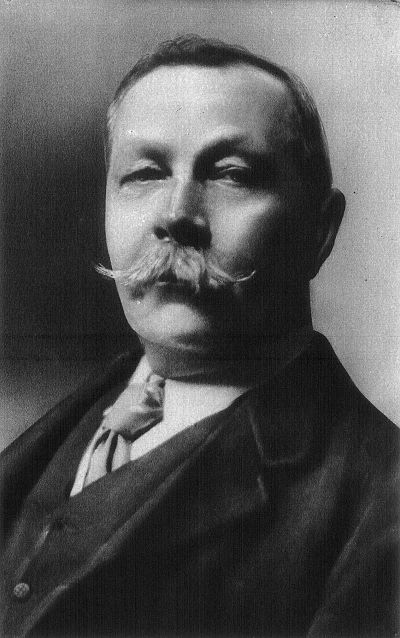I love Sherlock Holmes stories.
On any given night, I go to sleep hearing Charlton Griffen read the stories to me. Somewhere in my heart, it is always 1895 and the game is always afoot.
Thank you, Sir Arthur Conan Doyle.

Oddly, this bright medical doctor went off into an odd mental corner. He became fascinated with Spiritualism and became an exceedingly effective debater for the cause. Doyle did an odd thing for a very decent reason. He was a good man who hated the decay of British morality and he felt that this was caused by a rejection of life after death. If a person thought this life was all there was or ever would be, then the temptation would be overwhelming to live for short term gain.
Arthur Conan Doyle understood everybody was broken, but that the knowledge that there was more helps most of us do what is right. Life beyond life doesn’t make us perfect, but it does give a helpful perspective.
I am always amused that skeptics are surprised when their leadership flirts with the fans and then exploits them. Work in Apologetics long enough and you see the atheist “feminist” chat up the female workers and the “religious” person going astray.
Christians are not surprised when our leaders fail, because we know people are broken. If you think that “reason” or “education” will save you and that religion is the problem, it must be disappointing when you discover that “reason” is just another grift and “education” does not make you a whit more moral.
There is a near certainty that the man who thinks you can get “ought” from “is” will believe that “ought” includes his own pleasures after a drink or two. Doyle got it. Society needs most men to know that judgement is coming, which is the fact of the matter.
Since people needed science, Doyle thought Spiritualism could provide the evidence. The seance would prove what the empty tomb suggested: there is life after death.
He was right. There is some evidence, though very mixed in quality and much less that he hoped, that the dead live on, but Doyle wanted certainty.
He understood that, of course, religion did not stop all the grifters. In fact, the better the belief system, the more frauds would come, but the societal effect was still good overall. Grifters soon get caught or marginalized, but the truth endures.
Yet Doyle missed something. Society might be saved and the individual lost. There is good data to be mined in the vaults of The Society of Psychical Research, but Doyle himself drifted into irrationality looking for rational religion. Doyle was a medical doctor and no fool. He grasped that there was something there to study and even was willing to bust frauds, but he was too eager. If some were too skeptical, he became too credulous and was willing to believe young girls photographed fairies.
He got the big question right, but the particulars wrong.
Houdini was a match made in hell for the doctor. Houdini was not scientifically trained and knew little about the big question, but he did know how to spot a fraud. Magic helped him do it. Doyle didn’t mind busting fake mediums, until Houdini challenged his own wife and believed she failed the test.
Doyle played the fool with Houdini and the escape artist drifted away. But if Houdini could spot a particular fraud, he did not understand the general phenomenon he was investigating. He was hard to fool in particulars (phony mediums, tricksters), but dubious when it came to philosophy.
He could swallow materialism, even if he only dimly understood what he was accepting. Houdini could not see beyond the frauds to the phenomenon . . . from the particular to the general. One had enough education to know the big picture, but too much credulity. The other lost the metaphysics for his particular experience. He lacked the sophistication to see more.
Together they might have made progress, but Houdini was too quick to dismiss and Doyle too quick to believe. God help us, but that is all too familiar. Some of us believe too easily due to our own gifts and some of us are lost in our own disappointments.











